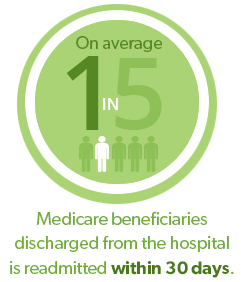
Ready, Set, Go Home: Transitional Care for Seniors in Northbrook, IL
One of the most critical times for family members in Northbrook, Illinois with medical conditions is when there’s a drastic change in their care.
These transitions can occur for a variety of reasons, including changes in a patient’s health status, like going home from the hospital, or moving between different inpatient healthcare facilities, such as acute care, skilled nursing facilities, or nursing homes. Transitional care is designed to prevent lapses in care and ensure that patients receive appropriate follow-up and support during these critical periods to avoid ending up back in the hospital.
Visiting Angels is proud to provide these crucial transitional care services to seniors in Northbrook, Illinois.
Are Transitional Care Services Important?
Whether transitioning from a hospital to home, from a rehabilitation center to a long-term care facility, or any other change in care environment, the continuity of care and coordination provided by a transitional care team can reduce hospital readmission and significantly improve quality of life.
Alternative or Supplement to Short-Term Care Facilities
For many seniors, the thought of staying in a short-term care or assisted living facility can be daunting and unappealing. After a hospital stay, we all just want to go home.
Transitional care is a valuable alternative for seniors to get the necessary support and rehabilitation services in the comfort of their own homes. Tailored to the individual needs, transitional care can bridge the gap, without the need for a facility stay. It can improve mental and emotional well-being, without having to compromise on care.
Reduces the Risk of Hospitalization
One of the primary goals of transitional care management is to minimize the risk of rehospitalization.
Without proper follow-up and support, many patients end up back in the hospital due to complications, lack of follow through, or simply not understanding discharge instructions. Transitional care services help patients adjust to the change by properly addressing the care and condition needs and helping them develop better self-care practices. This significantly reduces the likelihood of readmission.
Effects of Hospitalizations on Older Adults
Hospital stays can be particularly challenging for older patients.
Prolonged stays can lead to a decline in physical and cognitive functions, increased susceptibility to infections, and a higher risk of complications such as pressure ulcers and delirium. Having transitional care services can reduce these situations and help them recover quicker.
Prepares the Environment for Safety
Safety is a key part of the transition process. It’s important to make sure the home is updated to accommodate any changes or limitations in the patient’s abilities. A safe environment is more conducive to recovery.
This involves evaluating the home for potential hazards and making necessary modifications, such as installing grab bars or removing tripping hazards, to ensure that the patient has easy access to all necessary medical supplies and equipment.
Transition Care Can Include
- Non-Medical Home Care Services
- Assistance with daily living activities such as meal preparation, housekeeping, and laundry
- Respite care for care providers
- Personal Care Services
- Help with personal hygiene tasks like bathing, dressing, grooming, and toileting
- Basic home tasks like laundry
- Companion Care Services
- Companionship to reduce feelings of loneliness and isolation
- Activities such as reading, playing games, or taking walks
- Mobility and Transfers
- Ensure safe movement around the home, including assistance with walking and using mobility aids
- Help with transfers from bed to chair, wheelchair to toilet, and other movements to prevent injury
- Nutritional Support
- Plan and prepare meals for balanced, proper nutrition
- Assist with feeding, if necessary, and monitor dietary restrictions
- Transportation Services
- Arrange for transportation to medical appointments, social activities, and errands
- Ensure access to safe and reliable transportation options
- Home Safety Assessment
- Evaluate the home for potential hazards and make recommendations to improve safety
- Arrange for necessary home modifications or equipment, such as grab bars or ramps
- Medication Management
- Review all medications to prevent errors and adverse reactions
- Ensure understanding of medications, dosages, and schedules.
- Care Coordination
- Facilitate communication between health care providers so everyone is informed about the status and patient care plan
- Coordinate with home health services, physical therapy, and other necessary services
- Patient and Family Education
- Teach patients and their caregivers about managing their health conditions, recognizing warning signs, and knowing when to seek help
- Provide instructions on wound care, diet, exercise, and other aspects of self-care
- Emotional and Psychological Support
- Offer counseling or therapy to help patients cope with the stress of transitioning between care settings
- Provide support to help caregivers manage stress and avoid burnout
How to Reduce Hospital Readmissions
Hospital readmissions and visits to emergency departments can be stressful and challenging for patients and their families. Addressing key causes can help reduce the likelihood of returning to the hospital.
Manage Chronic Conditions
Chronic care management for conditions like diabetes or heart disease is crucial. Continuous monitoring, proper medication management, and patient education on recognizing symptoms can help keep these conditions under control and prevent readmissions.
Prevent Falls and Address Balance Issues
Falls are a common cause of readmissions, especially for older adults. We can help by conducting home safety assessments, installing grab bars, and providing mobility aids. Physical therapy and balance exercises can also improve stability and prevent falls.
Reduce Confusion
Cognitive impairment can lead to complications. Clear communication, involving family caregivers in the discharge process, and providing written instructions can help patients understand their care plans and avoid confusion.
Avoid Relapse or Adverse Event
Relapses or new health issues can occur after discharge. Comprehensive discharge planning and regular follow-up care through telehealth or home visits can help detect and address potential problems early.
Prevent Post-Hospitalization Syndrome
According to an article in the New England Journal of Medicine:
Nearly one fifth of Medicare patients discharged from a hospital—approximately 2.6 million seniors—develop an acute medical problem within the subsequent 30 days that necessitates another hospitalization.
Visiting Angels can help reduce that.
After leaving the hospital, patients may feel weak or stressed. Providing support with proper nutrition, physical rehabilitation, and psychological care can help them recover more fully and reduce the risk of readmission.
Visiting Angels Is Here To Help
Prepare for your senior loved one’s successful return home with a high-quality, customized care program. Download the Ready, Set, Go Home Discharge Guide now to get started!
Connect with Visiting Angels for a free consultation on transitional care services for seniors in Northbrook, IL.
Serving Northbrook, Glenview, Highland Park, Skokie, Evanston and Surrounding North Suburbs
Visiting Angels NORTHBROOK, IL
1955 Raymond Drive #108Northbrook, IL 60062
Phone: 847-999-3313

